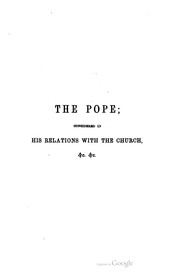Check nearby libraries
Buy this book

This edition doesn't have a description yet. Can you add one?
Check nearby libraries
Buy this book

Previews available in: English
Subjects
Popes| Edition | Availability |
|---|---|
| 1 |
cccc
|
| 2 |
aaaa
Libraries near you:
WorldCat
|
Book Details
Published in
London, England
Table of Contents
CONTENTS.
BOOK FIRST.
OF THE POPE IN HIS RELATIONS WITH THE CATHOLIC CHURCH.
CHAPTER I.
Infallibility 1
CHAPTER II.
Councils 9
CHAPTER III.
Definition and authority of Councils 11
CHAPTER IV.
Analogies derived from temporal power 17
CHAPTER V.
Digression on what is termed the youth of nations 21
CHAPTER VI.
Supremacy of the Sovereign Pontiff recognized in every age. Catholic testimonies of the Churches of the West and of the East 24
CHAPTER VII.
Striking testimonies of the Gallican Church 34
CHAPTER VIII.
Jansenist evidence. Text from Pascal and reflections on the weight of certain authorities 36
CHAPTER IX.
Protestant evidences 39
CHAPTER X.
Testimonies of the Russian Church, and through it of the Greek dissenting Church 45
CHAPTER XI.
On certain texts of Bossuet 55
CHAPTER XII.
Of the Council of Constantia 63
CHAPTER XIII.
Of Canons in general, and appeal to their authority 67
CHAPTER XIV.
Examination of a particular difficulty raised against the decisions of the Popes 71
CHAPTER XV.
Infallibility de facto 76
CHAPTER XVI.
Answer to some objections 96
CHAPTER XVII.
Of infallibility in the philosophical system 100
CHAPTER XVIII.
No danger in the consequence of a recognized supremacy 101
CHAPTER XIX.
The same subject continued ; further explanations in regard to Infallibility 106
CHAPTER XX.
Observations on discipline concluded: Digression on the Latin language 109
BOOK SECOND.
THE POPE IN HIS EELATIONS WITH TEMPORAL SOVEREIGNTIES.
CHAPTER I.
A few words on Sovereignty 115
CHAPTER II.
Inconveniences of Sovereignty 116
CHAPTER III.
Ideas of antiquity on the great problem 121
CHAPTER IV.
Further considerations on the same subject 125
CHAPTER V.
Distinguishing characteristic of the power exercised by the Popes 128
CHAPTER VI.
Temporal power of the Popes — Wars which they have sustained as temporal princes 132
CHAPTER VII.
Objects the Popes had in view in their contests with sovereign princes 149
CHAPTER VIII.
The nature of the power exercised by the Popes 172
CHAPTER IX.
Justification of the Pontifical Power 175
CHAPTER X.
Exercise of the Pope’s supremacy over temporal sovereigns 185
CHAPTER XI.
Hypothetical application of the preceding principles 193
CHAPTER XII.
On the wars alleged to have arisen from the shock of the two powers 197
CHAPTER XIII.
Continuation of the same subject — Reflections on the wars 210
CHAPTER XIV.
The Bull of Alexander VI., “intereastern" 215
CHAPTER XV.
The Bull “In coend Domini” 217
CHAPTER XVI.
Digression on ecclesiastical jurisdiction 220
BOOK THIRD.
THE POPE IN HIS RELATIONS WITH CIVILIZATION AND THE HAPPINESS OF NATIONS.
CHAPTER I.
Missions 224
CHAPTER II.
Civil liberty of mankind 237
CHAPTER III.
Institution of the Priesthood — Celibacy of Priests 245
CHAPTER IV.
Founding of European Monarchy 273
CHAPTER V.
How long princes commonly live — Secret alliance of Religion and of Sovereignty 281
CHAPTER VI.
Observations on Russia 286
CHAPTER VII.
Further particular considerations on the Eastern Empire 290
CHAPTER VIII.
Recapitulation and conclusion of Book Third 295
BOOK FOURTH.
THE POPE IN HIS RELATIONS WITH THE CHURCHES CALLED SCHISMATICAL.
CHAPTER I.
Every schismatical Church is Protestant — Affinity of the two systems — Testimony of the Russian Church 300
CHAPTER II.
Pretended invariability of dogma in the separated Churches in the twelfth century 304
CHAPTER III.
Further considerations arising from the position of the Photian churches; particular remarks on the Anglican and Russian sects 307
CHAPTER IV.
On the designation of Photian applied to the schismatical churches 310
CHAPTER V.
Impossibility of giving to the separated churches a name expressive of unity. — Principles of the whole discussion, and predilection of the author 314
CHAPTER VI.
False Reasonings of the separated churches ; reflections on national and religious prejudices 322
CHAPTER VII.
Of Greece and its character. — Arts, sciences, and military power 325
CHAPTER VIII.
The same subject continued. — Moral character of the Greeks. Their hatred to the people of the West 331
CHAPTER IX.
A particular trait of the Greek character. — Spirit of division 334
CHAPTER X.
A Photian paralogism cleared up. — Advantage pretended to be derived by the Photian churches from priority in chronological order 336
CHAPTER XI.
What must be expected of the Greeks 341
Conclusion of the Book.
ID Numbers
Community Reviews (0)
Feedback?| March 5, 2021 | Edited by ImportBot | import existing book |
| July 24, 2020 | Edited by MARC Bot | import existing book |
| June 25, 2019 | Edited by Charles Horn | merge authors |
| November 30, 2015 | Edited by ww2archive | added edition |
| December 9, 2009 | Created by WorkBot | add works page |











